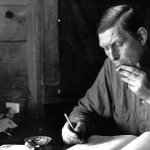Written in A Moment of Exasperation
How can you lie so still? All day I watch
And never a blade of all the green sod moves
To show where restlessly you toss and turn,
And fling a desperate arm or draw up knees
Stiffened and aching from their long disuse;
I watch all night and not one ghost comes forth
To take its freedom of the midnight hour.
Oh, have you no rebellion in your bones?
The very worms must scorn you where you lie,
A pallid mouldering acquiescent folk,
Meek habitants of unresented graves.
Why are you there in your straight row on row
Where I must ever see you from my bed
That in your mere dumb presence iterate
The text so weary in my ears: "Lie still
And rest; be patient and lie still and rest."
I'll not be patient! I will not lie still!
There is a brown road runs between the pines,
And further on the purple woodlands lie,
And still beyond blue mountains lift and loom;
And I would walk the road and I would be
Deep in the wooded shade and I would reach
The windy mountain tops that touch the clouds.
My eyes may follow but my feet are held.
Recumbent as you others must I too
Submit? Be mimic of your movelessness
With pillow and counterpane for stone and sod?
And if the many sayings of the wise
Teach of submission I will not submit
But with a spirit all unreconciled
Flash an unquenched defiance to the stars.
Better it is to walk, to run, to dance,
Better it is to laugh and leap and sing,
To know the open skies of dawn and night,
To move untrammeled down the flaming noon,
And I will clamour it through weary days
Keeping the edge of deprivation sharp,
Nor with the pliant speaking on my lips
Of resignation, sister to defeat.
I'll not be patient. I will not lie still.
And in ironic quietude who is
The despot of our days and lord of dust
Needs but, scarce heeding, wait to drop
Grim casual comment on rebellion's end;
"Yes, yes . . Wilful and petulant but now
As dead and quiet as the others are."
And this each body and ghost of you hath heard
That in your graves do therefore lie so still.


















Comment form: